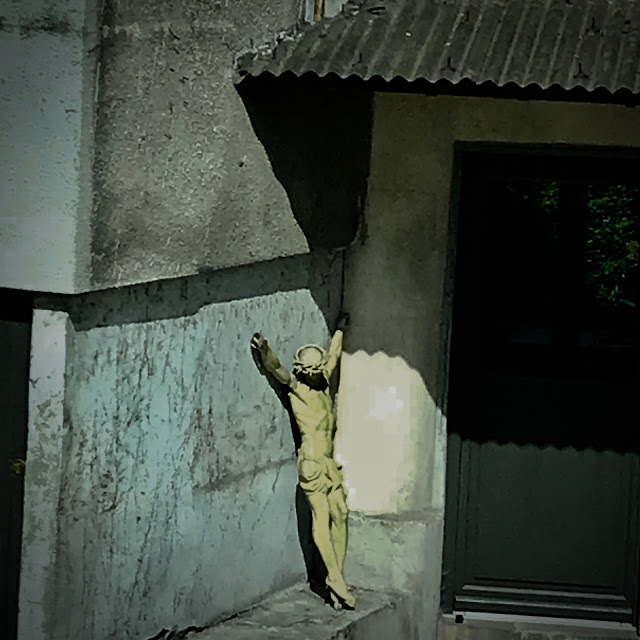Amid the Divisions
 |
When the world is in chaos and you are getting upset or frustrated or fearful or just plain angry, it is good to stay in your pajamas all day and pull the covers over your head. It is good to remember that the Krispy Kreme has a 24-hour drive through. And when the world is like that and you’re just exhausted from trying to navigate it, it’s even ok for you to just binge watch all nine seasons of The Office instead.
Maybe you can relate.
These are hard days, hard weeks, hard months. Everyone is challenged, living in a time of pandemic, a time of economic hardship, a time of civil unrest, racial divide, a time when there are so many messages out there coming from so many directions and so many demands to answer to. And even as we say we just wish things would get back to normal, there is this growing feeling that some things we loved or even just took for granted have been lost for ever. Some things are not coming back, some ways of being in the world are not coming back because some truths have been revealed during this hard time. The pandemic, the economic woes, the protests, the news, the changes we have had to make in our every day lives and the changes we are being asked to make in this new world we find ourselves in have revealed some cracks, some fissures, even some chasms that we can no longer ignore.
And it turns out that this is exactly what Jesus has to say to us in the Gospel today. He has been speaking to his disciples these last few weeks, giving them a sort of missionary speech. He’s been telling them like it is, and he really gets to the heart of it this week, naming the challenges and the hardships, saying difficult and even upsetting things about divisions (I did not come to bring peace but a sword; one’s foes will be the members of one’s own household) and even death. The most comforting thing he says is that God knows the number of hairs on our heads and that we are of more worth than the sparrows sold in the marketplace, and I am grateful for that, but golly this is hard. I want Jesus to bring peace, not division.
But I know it’s true. In Jesus’s day, and especially within the community for which this Gospel was written, there were many divisions. The Jewish community out of which Jesus and many of his followers came was fracturing from the pressure of the demands of the Roman Empire. And people had different ideas about how to deal with the Roman threat. Some wanted to lay low, keep heads down, acquiesce as much as possible, go along to get along in hopes that the Empire would just leave them alone to live the way that they wanted to. Others wanted to overthrow imperial rule, to shake off the system of taxation that supported the far-flung Empire, to be ruled by God alone and not some Emperor or King, and their tactics were not what one would call peaceful. They were called Zealots, rebels, fanatics even. They pushed against the Romans until the Romans had had enough and they besieged Jerusalem, tore down its walls and burned the Temple to re-establish and enforce their rule.
During this time the Jesus followers, beginning to be called Christians, separated from their Jewish roots. It was not always peaceful. We see the pain of this separation particularly in the Gospels of Matthew and John who speak of people being kicked out of the synagogues for following Jesus. And so people were separated, even within families, depending on their beliefs and allegiances. And the longer that separation went on, the larger the chasm between the different groups became.
So here we are now, still separated, still divided, and Jesus is still trying to send us out into the world, acknowledging the realities that beset us still but asking us to set aside our fears in the midst of all this trouble. We cannot escape the trouble, it’s part of living in a world in which power is worshipped and glorified.
It’s not going to be easy to follow me, Jesus says. It will lead to the cross, and by taking up the cross he doesn’t mean dealing with mere inconvenience.
Ultimately, Jesus asks us to stand up with those whom the Empire is willing, maybe even anxious, to crush. He asks us to make no peace with oppression, to separate ourselves from the part of our culture that deems some people or groups of people expendable, casualties in the pursuit of power and dominance. He asks us to redefine the worth of those who the world thinks is worthless. He asks us to stand with them on the other side of the line that society draws out of hatred or fear or just plain ignorance. That’s how we take up the cross.
Some of us have the privilege to be able to ignore or not notice the chasms between us because we are not suffering what others suffer. Maybe the first step is just looking, deeply looking, and seeing what it is like to be someone else. Ultimately, we pray that our divisions may cease. We pray that we all might be one. That doesn’t mean praying that everyone might be like us.
And so Jesus sends us out in the midst of our divisions to live out the gospel, that God is love, no exceptions, and everybody counts. Not everyone is going to like that message, Jesus assures us of that, maybe we don’t even like it and wish we could just pull the covers back over our heads, but proclaiming and living out that Gospel is where we will find life.
Comments